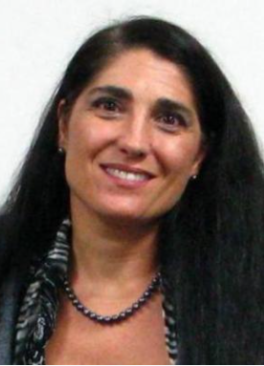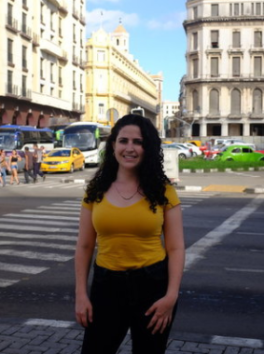The Department of Spanish and Portuguese is dedicated to the teaching, creation, and exchange of knowledge about the languages, linguistics, literatures, and cultures of the Spanish and Portuguese speaking world. In addition to the COVID-19 pandemic’s impact on our courses within the department, SPPO also had to change the ways in which research can be shared with others in the field. Dr. Ana del Sarto, Associate Professor of the Literatures and Cultures of Latin America, and Ashlee Dauphinais, a Ph.D. candidate in Hispanic Linguistics, have both participated in events during the Autumn 2020 in which they shared their research virtually.

In October, Dr. Del Sarto presented her research as part of an online lecture series organized by the University of Santiago del Estero in Argentina. “I was really excited about the opportunity. The university is only one of two in Argentina with a master’s program in cultural studies. My lecture was part of a series exploring different productions of cultural studies within academia.” She was thankful for the opportunity to present in a virtual capacity, since the lecture series wouldn’t have been possible in an in-person capacity due to the pandemic. She found it was convenient to be in her own home, using her own technology. It also allowed her to present to a much wider audience, as students from Argentina, Colombia, and the United States tuned in for the event. She noted, however, that giving a virtual presentation doesn’t have quite the same energy as physically being in the same room with an audience. “I find it helpful to feel the energy in the room and read body language, which just isn’t possible in an online setting.”
Ashlee Dauphinais presented virtually in the Spanish 8893 colloquium course. She was presenting research that she hopes to defend in her dissertation. “My research focuses on linguistic and social practices among women with Turner’s Syndrome in Brazil, specifically Rio de Janeiro. Turner’s Syndrome is an intersex genetic condition. A person with Turner’s Syndrome only had one X chromosome present, rather than two chromosomes (XX or XY). This can impact the body in many ways – differences in stature, hormones, etc. A lot of women with Turner’s Syndrome are phenotypically female, but they don’t go through spontaneous puberty.” Dauphinais was awarded a Fulbright-Hays Scholarship that allowed her to live in Brazil for a full year to pursue her research. She spent 2019 in Brazil doing fieldwork, conducting interviews, and observing doctor-patient interactions at two different hospitals that treat a large number of women with Turner’s Syndrome. “Linguistically, I was interested in their practices and how they talked about Turner’s Syndrome. Then on a more cultural level, I was studying how their social world was impacted by the genetic condition.”

Dauphinais’ colloquium presentation this past October was the first time she had presented this data. It was also the first time she had ever presented in an online format. “I didn’t feel quite as much pressure. I was just sitting in front of my computer at my desk in my home, basically what I had been doing since the pandemic started. But when you present online, it’s a lot harder to read people. The physical cues that you notice in front of a live audience aren’t the same through a screen.” Dauphinais noted that the construction of her presentation materials was different too. “Normally, you wouldn’t want to be reading off of the PowerPoint slides, you’d want everyone focused on the presenter. But in this type of format, it takes more effort for your brain to process information, so more text needs to be included in the PowerPoint.”
Both Dr. Del Sarto and Dauphinais believe that, though virtual presentations have their limitations, they have been an important way to disseminate research within academia during the pandemic. Dauphinais believes that, “It will be a great option to keep in mind after the pandemic is over as well. We will always hold in-person events, because those just can’t be replaced, but having the opportunity to participate in events through an online platform has opened the door to many opportunities that wouldn’t be possible otherwise. For example, I was able to audit the course of a professor in my field at UCLA who I really admire. I never would’ve had that opportunity if it hadn’t been for the online format of the course.” Similarly, Dr. Del Sarto feels that utilizing both in-person and online modalities can only be beneficial. “I think a mixture of both types of events will offer a lot more flexibility. Online presentations and lecture series are a great way for people from across the world to connect and share their ideas. I think in-person events are still important, but now that we have the infrastructure, we should definitely utilize both formats when we can gather again.”
You can read Dr. Ana del Sarto’s article on which she based her presentation, “Latin American and Critical Cultural Studies,” published in the Oxford Research Encyclopedia of Communication, below.
